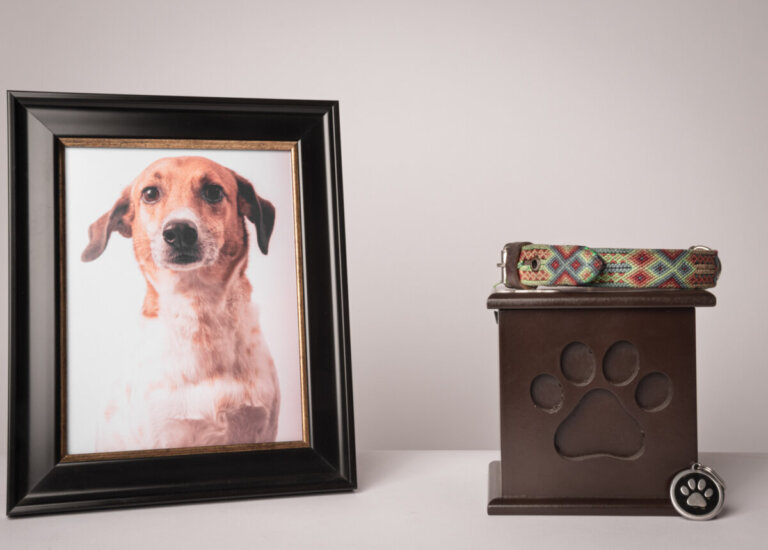7 Keys to Overcome the Euthanasia of Your Pet


Written and verified by the veterinarian and zootechnician Sebastian Ramirez Ocampo
The time has come to say goodbye, and it’s normal for feelings of grief, sadness, and a certain degree of guilt to come over you regarding the euthanasia of your pet. Even though you feel that you did the right thing, the emotions overwhelm you, and you feel like it’ll be impossible to recover. However, life goes on, and with it, the hope of experiencing once again a special connection like the one formed with these noble beings.
For this reason, it’s important that you grieve properly so that the loss doesn’t negatively influence your physical and mental well-being. To move in this direction, you can keep an object of remembrance, pay tribute to your loyal friend, and seek professional help. In the following article, we’ll delve into methods and strategies for overcoming the death of a pet by euthanasia.
“Nobody can fully understand the meaning of love unless he’s owned a dog. A dog can show you more honest affection with a flick of his tail than a man can gather through a lifetime of handshakes.”
–Gene Hill–
Euthanasia is an act of mercy
Especially in Western culture, pets are like integral members of modern families. The bonds between the two species are strong and close. In fact, it’s sometimes similar to those bonds formed between parents and their children.
Unfortunately, the life expectancy of companion animals isn’t as long as we wish, so their loss is an inevitable experience in every guardian’s life.
In terms of the American Veterinary Medical Association (AVMA), euthanasia is a procedure by which the physical and emotional suffering of an animal is ended.
Euthanasia is resorted to when the bodily conditions of an animal are incompatible with a good quality of life.
It’s possible to consider this practice as the last act of kindness that a guardian performs with his or her pet, as it frees it from unnecessary pain and from a condition that has no cure or is irreversible, such as deterioration due to old age.
If it’s the right thing to do, why do I feel so bad?
Although people know that euthanasia is the best alternative when a disease has no treatment, some guardians experience strong feelings of anguish, pain, and even guilt and depression.
As a study in the Veterinary Record magazine exposes, 30% of pet owners suffer a complicated grief process after the loss of their pet. According to the authors, a large part of this bad experience is due to the fact that the mourning is done privately. In other words, it doesn’t involve the social recognition and emotional support it really needs.
In addition, according to an article in the Journal of Contemporary Ethnography, guardians may feel guilt about making the decision because they feel they didn’t do enough to prolong the life of their four-legged friend or that their pet’s life is coming to an end is due to actions they themselves took.
As a result, many people who grieve the loss of their companion feel isolated and misunderstood. This translates into an increased risk of developing unhealthy emotions.

How to overcome the euthanasia of your pet
There are several methods or strategies that can be employed to cope with this difficult moment. For example, in the United States, a group of 340 people were asked how they found comfort after the loss of their pet. In this research, published in the journal Veterinary Science, the following results were obtained:
- 58 % sought emotional support.
- 12 % relied on faith and prayer.
- 0.9 % participated in support groups.
- 74 % indicated that they grieved privately.
- 32 % adopted a new pet.
Like this one, there are several studies that support the theory that the mourning of an animal should be done as if it were a person or a close relative. Here are some methods that will help you deal with these painful emotions.
1. Keep some souvenirs
Keeping items that remind you of your pet can help you keep in mind the experiences you shared with your four-legged friend. Keep in mind that true death occurs when a loved one is forgotten. Therefore, you can treasure the following items:
- A portrait
- Photographs
- A collar or toy
- A plaque with their footprint
Also, it’s not healthy to pretend that this being never existed. This will create repressed feelings that, at some point, will come to the surface.
2. Create a legacy
You can perform actions capable of giving more value to their existence and their passage through your life. At the same time, these types of actions will allow you to express the best of your relationship with your pet and will help you in your mourning process. Here are some ideas:
- Create a photo album
- Plant a tree in honor of your pet
- Write stories about your pet
3. Pay a tribute and a dignified farewell
Give yourself a space and a moment in which you can say goodbye to your pet in a proper way. Although it’s not common, there are places that provide funeral services for these cases. If it’s not possible, make a tribute at their burial site or with their ashes that’ll allow you to remember all the beautiful moments and thank your pet for their loyal company.
“When we think of those companions who travelled by our side down life’s road, let us not say with sadness that they left us behind, but rather say with gentle gratitude that they once were with us.”
–Unknown–
4. Allow yourself to feel
Repressing your feelings will only make the situation worse. If you feel like crying, let it all out. Allow yourself to be sad, angry, anxious, or depressed. Externalizing these feelings is a normal process in the loss of a loved one.
In addition, they function as grief therapy. If you don’t, these emotions will be stored inside you and will negatively affect your mental and emotional health, even if you don’t realize it.
5. Try to find new meaning and joy in your life
Losing your pet doesn’t mean that you have to stop doing the activities you enjoy every day. There are several alternatives you can pursue, including the following:
- Go for a walk.
- Go hiking.
- Try new things.
- Spend time with your friends.
This doesn’t mean that you have to forget your lost pet or fill their void with other things. It just means that you need to move on and get on with your life.
6. Seek emotional support or professional help
Like you, there are many people who may be going through this painful event. Look for online forums, support groups, or animal welfare centers that have a better understanding of what you’re feeling.
Sharing your feelings is a strategy recommended by experts to overcome traumatic experiences, such as the death of a pet by euthanasia. If you think the emotions are overcoming you and you find it impossible or difficult to recover, it’s best to seek professional help for advice on how to deal with grief.
Remember that you’re not alone, and you’ll always find someone who understands you in your pain.

7. If you’re ready, adopt a new pet
If you’re an animal lover, don’t deny yourself the possibility of creating new experiences with another pet. It’s not about replacing the pet you’ve lost, but giving yourself the opportunity to bond with another life companion. However, do this only when you’ve healed the wound, as a new presence could awaken negative feelings within yourself.
“Dogs come into our lives to teach us about love, they depart to teach us about loss. A new dog never replaces an old dog, it merely expands the heart. If you have loved many dogs your heart is very big.”
–Erica Jong–
Know how to say goodbye
Grief is a personal experience, so there’s no specific formula for getting over the euthanasia of your pet. What you can do is put some of these strategies into practice and see which one helps or works best for you. Always keep in mind the positive memories and cherish the time you shared because, in the end, that’s the best way to honor your bond.
Feel free to take this opportunity to honor a pet who’s no longer with you by telling us about him or her in the comment section below!
The time has come to say goodbye, and it’s normal for feelings of grief, sadness, and a certain degree of guilt to come over you regarding the euthanasia of your pet. Even though you feel that you did the right thing, the emotions overwhelm you, and you feel like it’ll be impossible to recover. However, life goes on, and with it, the hope of experiencing once again a special connection like the one formed with these noble beings.
For this reason, it’s important that you grieve properly so that the loss doesn’t negatively influence your physical and mental well-being. To move in this direction, you can keep an object of remembrance, pay tribute to your loyal friend, and seek professional help. In the following article, we’ll delve into methods and strategies for overcoming the death of a pet by euthanasia.
“Nobody can fully understand the meaning of love unless he’s owned a dog. A dog can show you more honest affection with a flick of his tail than a man can gather through a lifetime of handshakes.”
–Gene Hill–
Euthanasia is an act of mercy
Especially in Western culture, pets are like integral members of modern families. The bonds between the two species are strong and close. In fact, it’s sometimes similar to those bonds formed between parents and their children.
Unfortunately, the life expectancy of companion animals isn’t as long as we wish, so their loss is an inevitable experience in every guardian’s life.
In terms of the American Veterinary Medical Association (AVMA), euthanasia is a procedure by which the physical and emotional suffering of an animal is ended.
Euthanasia is resorted to when the bodily conditions of an animal are incompatible with a good quality of life.
It’s possible to consider this practice as the last act of kindness that a guardian performs with his or her pet, as it frees it from unnecessary pain and from a condition that has no cure or is irreversible, such as deterioration due to old age.
If it’s the right thing to do, why do I feel so bad?
Although people know that euthanasia is the best alternative when a disease has no treatment, some guardians experience strong feelings of anguish, pain, and even guilt and depression.
As a study in the Veterinary Record magazine exposes, 30% of pet owners suffer a complicated grief process after the loss of their pet. According to the authors, a large part of this bad experience is due to the fact that the mourning is done privately. In other words, it doesn’t involve the social recognition and emotional support it really needs.
In addition, according to an article in the Journal of Contemporary Ethnography, guardians may feel guilt about making the decision because they feel they didn’t do enough to prolong the life of their four-legged friend or that their pet’s life is coming to an end is due to actions they themselves took.
As a result, many people who grieve the loss of their companion feel isolated and misunderstood. This translates into an increased risk of developing unhealthy emotions.

How to overcome the euthanasia of your pet
There are several methods or strategies that can be employed to cope with this difficult moment. For example, in the United States, a group of 340 people were asked how they found comfort after the loss of their pet. In this research, published in the journal Veterinary Science, the following results were obtained:
- 58 % sought emotional support.
- 12 % relied on faith and prayer.
- 0.9 % participated in support groups.
- 74 % indicated that they grieved privately.
- 32 % adopted a new pet.
Like this one, there are several studies that support the theory that the mourning of an animal should be done as if it were a person or a close relative. Here are some methods that will help you deal with these painful emotions.
1. Keep some souvenirs
Keeping items that remind you of your pet can help you keep in mind the experiences you shared with your four-legged friend. Keep in mind that true death occurs when a loved one is forgotten. Therefore, you can treasure the following items:
- A portrait
- Photographs
- A collar or toy
- A plaque with their footprint
Also, it’s not healthy to pretend that this being never existed. This will create repressed feelings that, at some point, will come to the surface.
2. Create a legacy
You can perform actions capable of giving more value to their existence and their passage through your life. At the same time, these types of actions will allow you to express the best of your relationship with your pet and will help you in your mourning process. Here are some ideas:
- Create a photo album
- Plant a tree in honor of your pet
- Write stories about your pet
3. Pay a tribute and a dignified farewell
Give yourself a space and a moment in which you can say goodbye to your pet in a proper way. Although it’s not common, there are places that provide funeral services for these cases. If it’s not possible, make a tribute at their burial site or with their ashes that’ll allow you to remember all the beautiful moments and thank your pet for their loyal company.
“When we think of those companions who travelled by our side down life’s road, let us not say with sadness that they left us behind, but rather say with gentle gratitude that they once were with us.”
–Unknown–
4. Allow yourself to feel
Repressing your feelings will only make the situation worse. If you feel like crying, let it all out. Allow yourself to be sad, angry, anxious, or depressed. Externalizing these feelings is a normal process in the loss of a loved one.
In addition, they function as grief therapy. If you don’t, these emotions will be stored inside you and will negatively affect your mental and emotional health, even if you don’t realize it.
5. Try to find new meaning and joy in your life
Losing your pet doesn’t mean that you have to stop doing the activities you enjoy every day. There are several alternatives you can pursue, including the following:
- Go for a walk.
- Go hiking.
- Try new things.
- Spend time with your friends.
This doesn’t mean that you have to forget your lost pet or fill their void with other things. It just means that you need to move on and get on with your life.
6. Seek emotional support or professional help
Like you, there are many people who may be going through this painful event. Look for online forums, support groups, or animal welfare centers that have a better understanding of what you’re feeling.
Sharing your feelings is a strategy recommended by experts to overcome traumatic experiences, such as the death of a pet by euthanasia. If you think the emotions are overcoming you and you find it impossible or difficult to recover, it’s best to seek professional help for advice on how to deal with grief.
Remember that you’re not alone, and you’ll always find someone who understands you in your pain.

7. If you’re ready, adopt a new pet
If you’re an animal lover, don’t deny yourself the possibility of creating new experiences with another pet. It’s not about replacing the pet you’ve lost, but giving yourself the opportunity to bond with another life companion. However, do this only when you’ve healed the wound, as a new presence could awaken negative feelings within yourself.
“Dogs come into our lives to teach us about love, they depart to teach us about loss. A new dog never replaces an old dog, it merely expands the heart. If you have loved many dogs your heart is very big.”
–Erica Jong–
Know how to say goodbye
Grief is a personal experience, so there’s no specific formula for getting over the euthanasia of your pet. What you can do is put some of these strategies into practice and see which one helps or works best for you. Always keep in mind the positive memories and cherish the time you shared because, in the end, that’s the best way to honor your bond.
Feel free to take this opportunity to honor a pet who’s no longer with you by telling us about him or her in the comment section below!
All cited sources were thoroughly reviewed by our team to ensure their quality, reliability, currency, and validity. The bibliography of this article was considered reliable and of academic or scientific accuracy.
- American Veterinary Medical Association. (2020, 15 de enero). AVMA Guidelines for the Euthanasia of Animals: 2020 Edition. https://olaw.nih.gov/policies-laws/avma-guidelines-2020.htm
- Matte, A. R., Khosa, D. K., Coe, J. B., Meehan, M., & Niel, L. (2020). Exploring pet owners’ experiences and self-reported satisfaction and grief following companion animal euthanasia. The Veterinary Record, 187(12), 122. https://bvajournals.onlinelibrary.wiley.com/doi/abs/10.1136/vr.105734
- Morris, P. (2012). Managing Pet Owners Guilt and Grief in Veterinary Euthanasia Encounters. Journal of Contemporary Ethnography, 41 (3). https://journals.sagepub.com/doi/abs/10.1177/0891241611435099
- Park, R., & Royal, K. (2020). A National Survey of Companion Animal Owners’ Self-Reported Methods of Coping Following Euthanasia. Veterinary Sciences, 7(3), 89. https://www.ncbi.nlm.nih.gov/pmc/articles/PMC7558086/
- Vonk, J., Corina-Bouma, E, A., & Dijkstra, A. (2022). A Time to Say Goodbye: Empathy and Emotion Regulation Predict Timing of End-of-Life Decisions by Pet Owners. Human- Animal Interaction Bulletin. https://www.cabidigitallibrary.org/doi/full/10.1079/hai.2022.0013
This text is provided for informational purposes only and does not replace consultation with a professional. If in doubt, consult your specialist.








